It’s no surprise that artificial intelligence (AI) will transform online industries worldwide, and digital marketing is no exception. Companies that add AI to marketing strategies can enhance customer targeting, improve personalization, and optimize campaigns for maximum return on investment (ROI) and optimal marketing efficiency ratio (MER).
How can you optimize your organization for AI? Other businesses are implementing AI transformation to their existing strategies.
This article will explore how organizations can harness AI to boost their marketing ROI, showcasing key benefits, best practices, and real-world examples to illustrate the transformative potential of AI-driven marketing.
Key Highlights on AI Transformation
- AI transformation is the integration of different technologies and tools to expedite digital marketing operations and help marketers make better decisions.
- AI will transform the marketing world in many ways, such as personalizing every step of the sales funnel and improving customer engagement with chatbots. AI transformation aims to push this innovation further.
- AI transformation can result in long-term success because it enhances customer targeting, optimizes your campaign for specific KPIs, reduces marketing costs, and improves customer retention.
- Some essential tools in an AI transformation strategy include CDPs, chatbots, predictive analytics, content creation, and programmatic advertising.
- Marketers interested in switching to an AI transformation strategy must set objectives for their technology, only collect high-quality data, test their performance, not forget human oversight, and stay compliant.
- Netflix, Coca-Cola, and AirBnB have achieved success with AI transformation.
- AI transformation will result in more personalized content, voice search analytics, customer lifecycle optimization, and more AI-assisted creativity.
TABLE OF CONTENTS:
What Is AI Transformation?
AI transformation refers to integrating artificial intelligence into an organization’s operations, strategies, products, services, insights, and decision-making frameworks.
It aims to drive efficiency, innovation, and growth by leveraging AI technologies—such as machine learning, natural language processing, and computer vision—to automate tasks, enhance data analytics, and improve customer experiences. AI transformation reshapes traditional workflows, enabling businesses to make data-driven decisions, personalize offerings, and optimize resource allocation.
The Rising Impact of AI in Marketing
AI is becoming a powerful enabler for companies looking to engage audiences. In analyzing massive volumes of data at a rapid pace, AI can help a marketing team understand patterns, predict trends, and generate insights at speeds far surpassing human capabilities. This enables companies to make data-driven decisions that maximize digital marketing spend and enhance customer satisfaction.
AI technology has enabled transformative marketing practices, including advanced customer segmentation, automated customer interactions, predictive analytics, and hyper-personalized campaigns.
Many organizations have already undergone AI transformation. 74% of organizations using generative AI already see a return on their investment. There’s a key reason why: AI boosts conversions. More studies show that AI-driven customer acquisition tactics increase conversion rates by as much as 30%.
There are other ways to engage your audience and increase conversion rates. Our marketing team operates with conversion rates in mind, ensuring you skyrocket your revenue.
Key Benefits of AI-Driven Marketing for ROI
If you plan on adopting AI transformation into your existing strategy, you’re setting yourself up for long-term success. Integrating AI into marketing operations can deliver these ROI-boosting benefits.
Enhanced Targeting and Personalization
With AI, marketers can segment audiences more precisely and target them with tailored messages. This improves both marketing and advertising tactics by increasing conversions and improving ROAS.
This is especially true when discussing personalization. 71% of consumers expect organizations to deliver personalized content.
Organizations can use AI to analyze vast amounts of behavioral data, consumer preferences, and buying patterns. Its predictive analysis offers precise targeting, ensuring businesses always reach their audience.
Generative AI can use this data to deliver marketing messages, ad copy, and email marketing messages to better target customers. Since this personalization leads to a better customer experience, brands will see an increase in conversion rates.
Enhanced targeting is the cornerstone of a successful advertising campaign. If you need to improve your ROAS, contact the advertising experts.
Improved Campaign Optimization
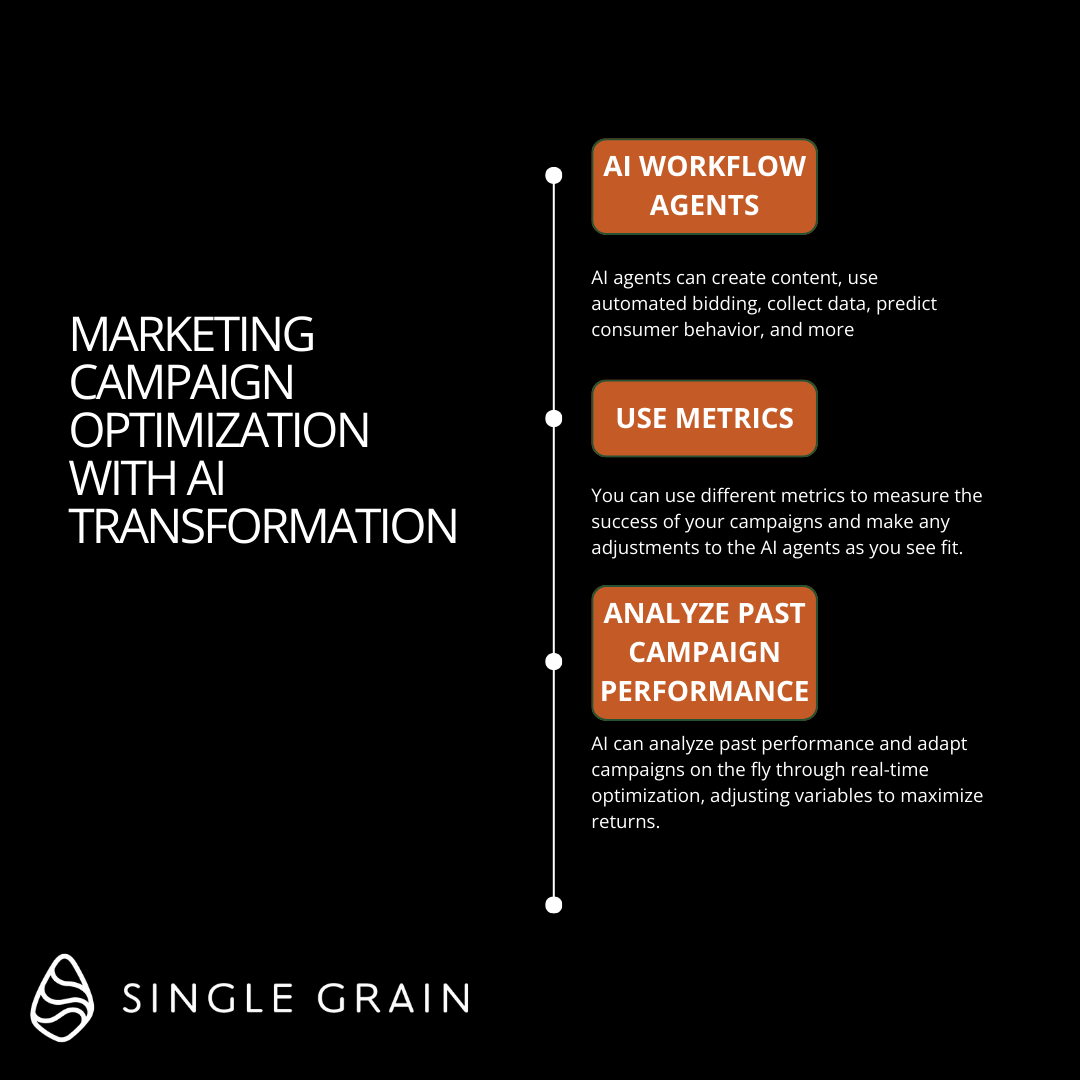
With the myriad of AI tools on the market, marketers can better optimize their campaigns for specific goals and KPIs.
AI workflows use various agents to create content, use automated bidding, collect data, predict consumer behavior, and more. Whether you want to increase sales, enhance reach, or accomplish any other objectives, you can use different metrics to measure the success of your campaigns and make any adjustments to the AI agents as you see fit.
In addition, AI tools can analyze past campaign performance and predict outcomes for new initiatives. With this, marketers can allocate budgets to high-performing channels and strategies, improving campaign efficiency and effectiveness. AI can adapt campaigns on the fly through real-time optimization, adjusting variables to maximize returns.
Reduced Marketing Costs
In one case study, Michelle Pfeiffer’s fragrance company, Henry Rose, partnered with AI software Constellation for its TikTok strategy. Henry Rose achieved a 15.4% decrease in cost per action and a 32.8% increase in ROAS. In addition, they achieved 1.9 million impressions and over 600 conversions.
As you can see, an AI-powered marketing campaign decreases costs and increases visibility and conversions.
There’s a key reason why: automation reduces the time and resources spent on repetitive tasks. While this case study focuses on TikTok marketing, brands can apply AI transformation to their marketing channel, specifically social media and email marketing. This cuts marketing costs and frees teams to focus on strategic initiatives.
Increased Customer Retention
91% of businesses feel positively about using AI to increase customer engagement. That’s because AI helps companies understand what keeps customers loyal.
AI agents can offer several tactics to target customers, such as lead scoring. This technology can analyze consumer demographics and social media interactions to better score leads. AI can identify leads that are likelier to purchase a product; as they go down the sales funnel, generative AI content creation can better nurture them until they convert to customers.
AI can also enable brands to engage customers with personalized and timely offers, such as discounts and rewards. This enhances loyalty and increases metrics like customer lifetime value (CLTV).
AI-Enabled Tools for Marketing ROI Transformation
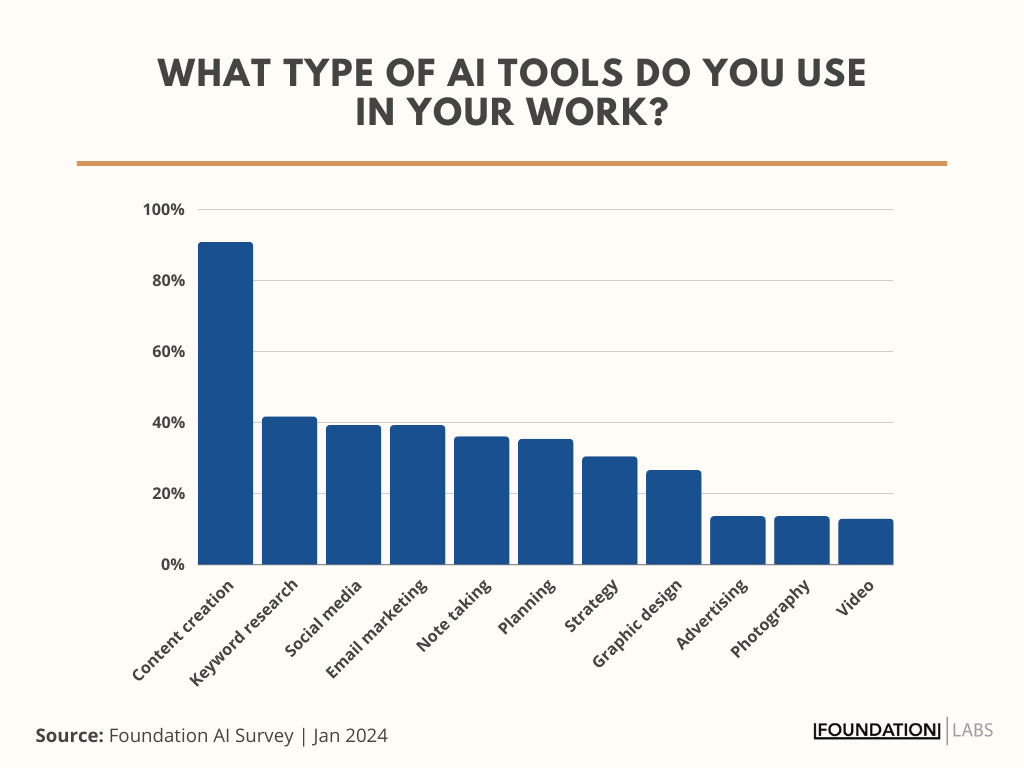
Source: Foundation
Several AI-powered tools and platforms are widely available today. Both agentic and generative AI tools can complete various marketing functions, collect data, segment your audience, execute different campaign tasks, offer budget allocation analytics, and predict future results, helping organizations make better marketing decisions.
The next steps to adopting AI transformation is by using specific technologies. Here are some of the best tools to add to your AI transformation campaign.
Customer Data Platforms (CDPs)
CDPs are AI-driven capabilities that collect customer data from various tools. This data is available in one place, allowing you to better understand your target audience.
The key benefits of these tools include:
- They provide a 360-degree view of each customer
- Enable personalized interactions across multiple channels.
- With insights from CDPs, marketers can create cohesive and highly targeted campaigns that yield better ROI.
Because of the accurate customer mapping, 89% of companies using CDPs said they experienced increased online sales.
Chatbots and Conversational AI
AI-driven chatbots enable businesses to engage customers in real time. Some additional benefits of using these tools include:
- Providing quick support and answers to questions.
- Reduce labor costs
- Improve digital user experiences by offering 24/7 support
This helps increase conversions and customer satisfaction—so much so that chatbots led to a 67% increase in sales.
Predictive Analytics
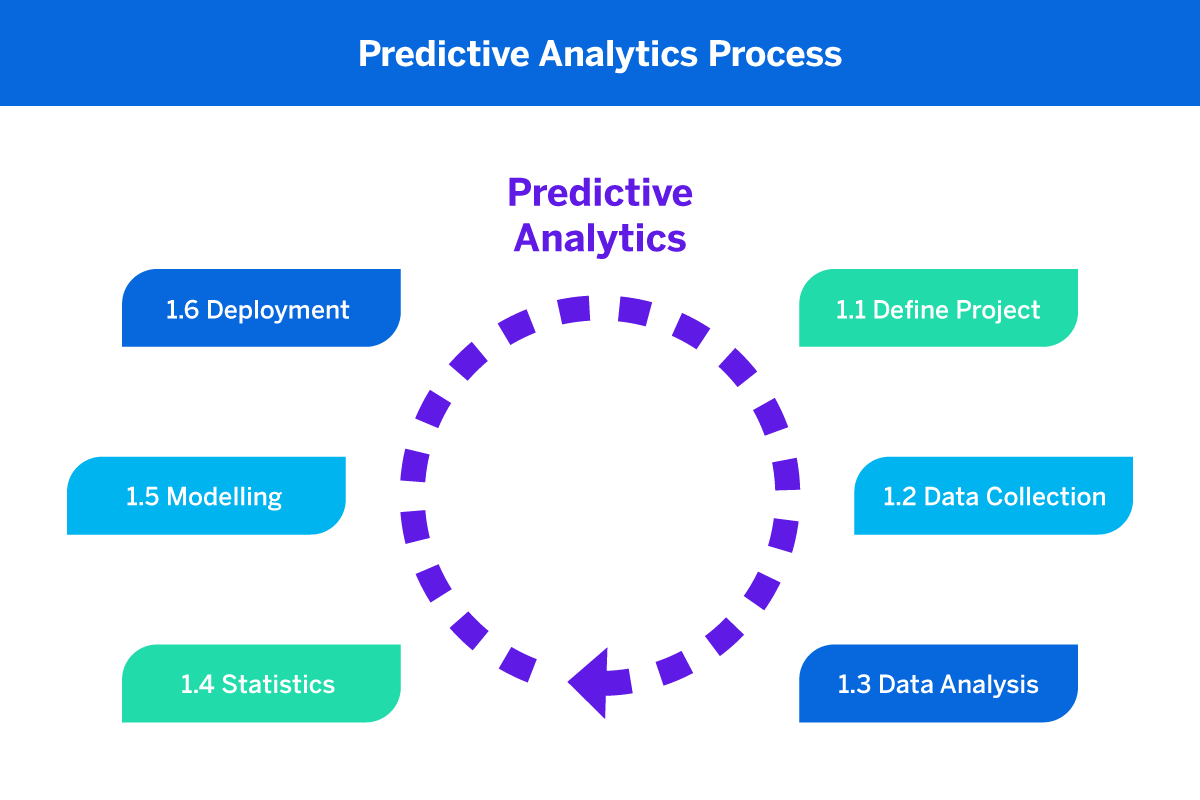
Source: Qualtrics
Predictive analytics leverages AI algorithms to forecast future customer interest and behavior based on past data.
Some benefits of these platforms include:
- AI can identify customers likely to churn and automatically trigger retention campaigns.
- Lead scoring
- Identifying prospects more likely to convert, which maximizes marketing ROI.
This data can help organizations predict future trends and generate actionable insights, enabling businesses to make data-driven decisions.
Content Creation and Curation Tools
AI-powered tools can generate content ideas and write text, pushing the full potential of human creatives.
Some additional benefits of these tools include:
- Recommend the best distribution times based on audience engagement patterns.
- Marketers can use AI-generated content on many channels, such as social media, email, and blogs.
- Expand their topic coverage to target user interests, preferences, and behaviors.
- Personalization features to target your audience’s needs better.
While AI can generate blog and advertising content, a team of talented experts cannot be replaced. If you need help with your content creation, give us a call.
Programmatic Advertising
Programmatic advertising uses technology to revolutionize the paid media and Google ads processes, encompassing everything from ad creatives to media buying.
Some additional benefits of these tools include:
- Buy ad space in real time.
- Use data such as demographics to ensure that ads are shown to the right people at the right time.
- Minimizing ad spend and maximizing conversions.
Best Practices for Implementing AI to Boost Marketing ROI
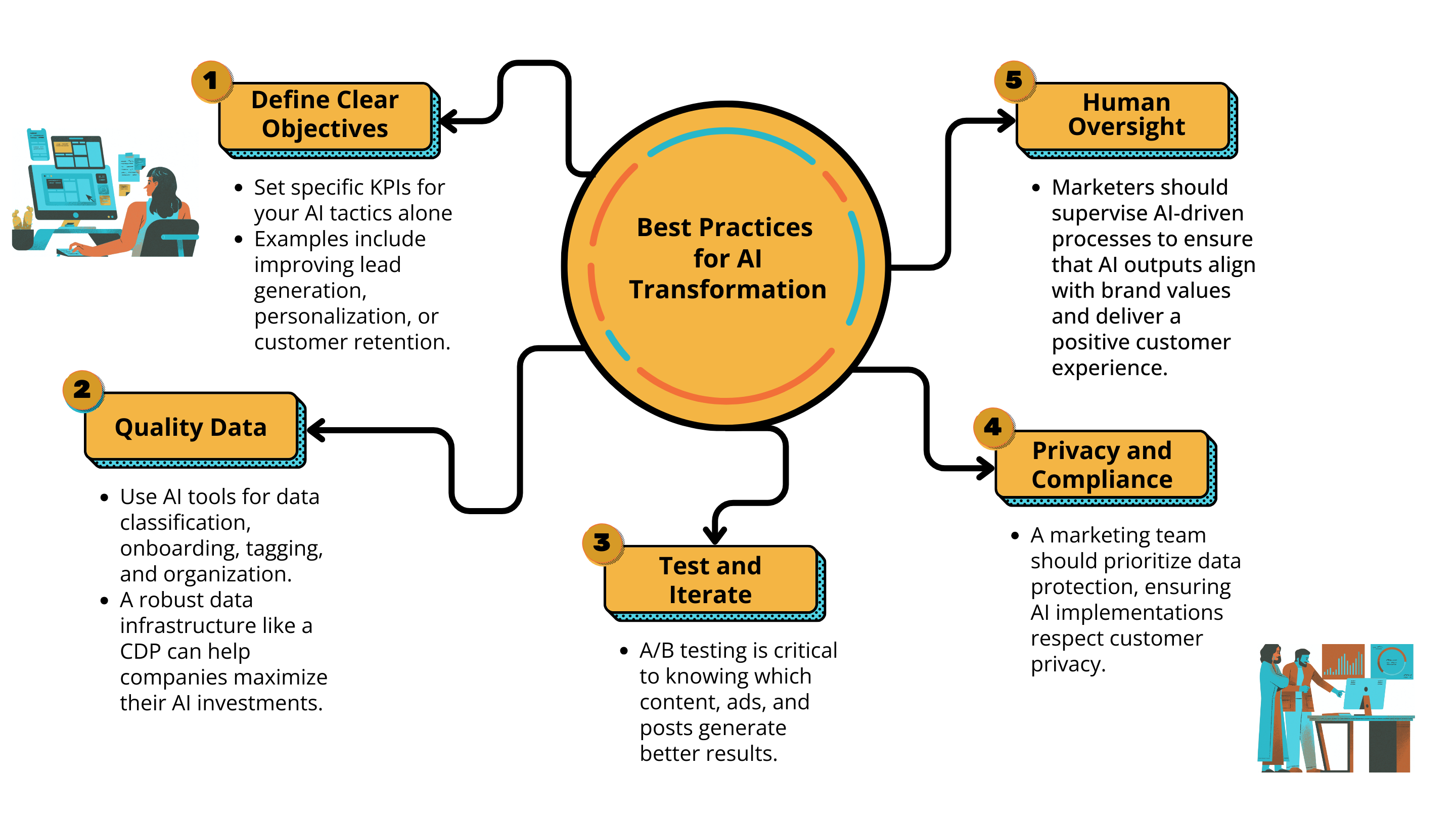
AI transformation and automation can make your strategy more efficient, leading to an increase in ROI. That said, marketers must also plan for challenges. To leverage AI for improved marketing ROI, companies should follow several best practices to ensure success.
Define Clear Objectives
Before deploying AI solutions, it’s essential to define clear marketing objectives. While creating goals is vital to all marketing strategies, you’ll want to set specific KPIs for your AI tactics alone. Examples include improving lead generation, personalization, or customer retention.
You can also set goals for the different AI tools you’re using. For example, if you’re adding chatbots, you can aim to improve the customer experience. With clear goals, you can track KPIs and avoid future challenges.
Quality Data
While data collection is the core of AI transformation strategies, you must collect quality data that aligns with your market. Use AI tools for data classification, onboarding, tagging, and organization. Prioritize specific strategies like sentiment analysis to tap into your audience’s emotional needs. A robust data infrastructure like a CDP can help companies maximize their AI investments.
Test and Iterate
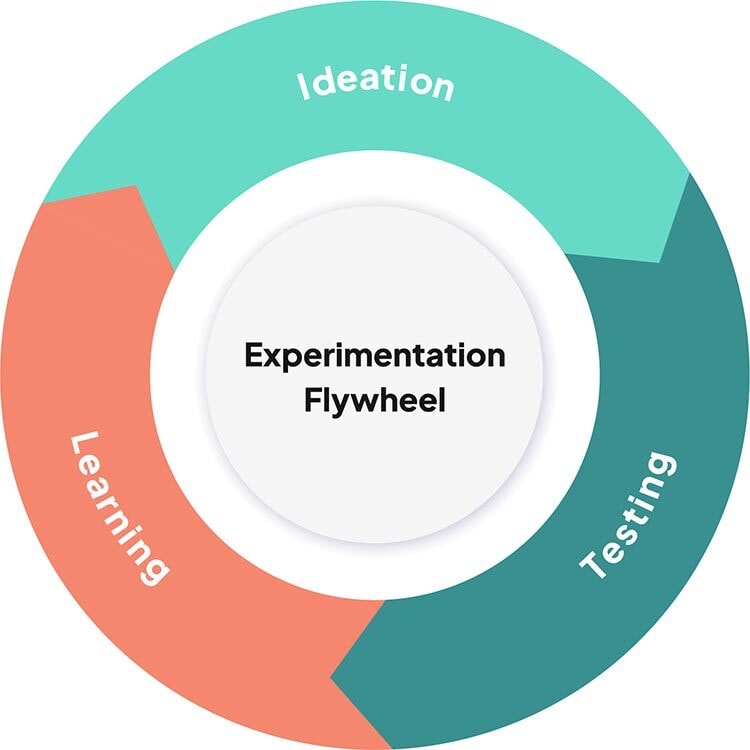
Source: Webtrends Optimize
AI implementations spawn new ideas, which benefit from iterative improvement. While continuous learning and adaptation are critical to maximizing AI’s impact on ROI, machine learning isn’t perfect, and new ideas can fail without proper testing.
A marketing team should experiment with various algorithms, tools, and approaches, analyzing results to identify what works best. A/B testing is critical to knowing which content, ads, and posts generate better results.
Maintain Human Oversight
While AI can benefit your marketing team in many ways, over-relying on this technology has serious consequences. Studies show that depending on AI results in decreased critical thinking skills. Even with all the marketing technology, nothing replaces the human touch in a campaign.
While AI can handle complex tasks, marketers should supervise AI-driven processes, especially in content creation and customer interactions, to ensure that AI outputs align with brand values and deliver a positive customer experience.
In addition, studies show that AI can replace as much as 95% of marketing creative work. While AI-generated content can expedite the creative process, this technology is still limited. Human creative minds must explain a brand’s core message and use compelling CTAs to drive sales.
Marketers must also be transparent about AI to staff members and customers. This ensures the organization can remain ethical and accountable for its messages.
Ensure Privacy and Compliance
AI processes large amounts of personal data, potentially putting your organization in legal jeopardy. Because of data privacy concerns, following privacy regulations like GDPR and CCPA is critical.
A marketing team should prioritize data protection, ensuring AI implementations respect customer privacy.
There are also ethical concerns; most Americans feel negatively about AI, with 75% of survey respondents saying they’re skeptical about this technology (depending on the industry). Remaining transparent and fair to staff and consumers is vital to maintaining accountability with AI use.
Case Studies: Real-World AI Adoption and Increased Marketing ROI
Are you convinced that AI transformation will improve your marketing campaign but would still like to see examples? You can see AI expertise in various industries. Here are a few AI transformation case studies from the biggest brands in the world.
Case Study 1: Netflix’s Personalized Recommendations
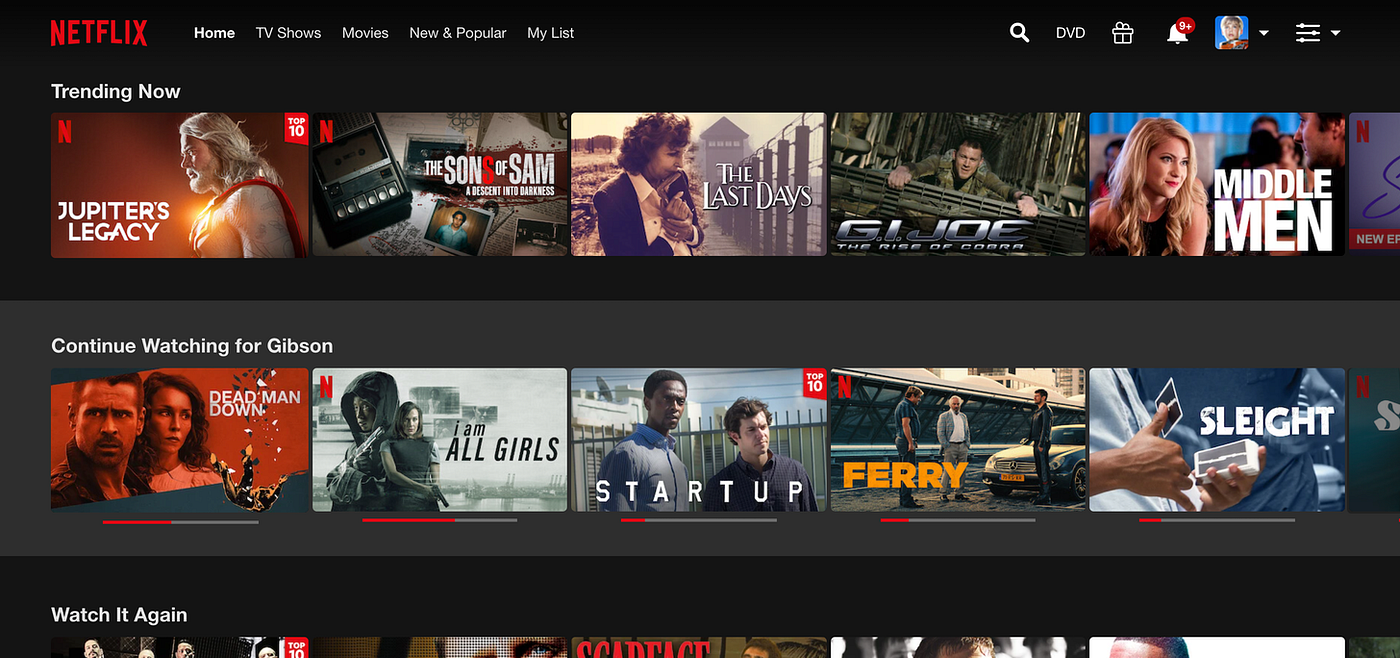
Source: Medium
Netflix has been a leader in leveraging AI for personalized recommendations. Its algorithm analyzes viewing behavior and preferences to suggest content that aligns with each user’s tastes. This accounted for 80% of the content viewed on the platform and contributed to a high customer retention rate, as users find value in Netflix’s tailored offerings.
Case Study 2: Coca-Cola’s Predictive Analytics and Vending Machines
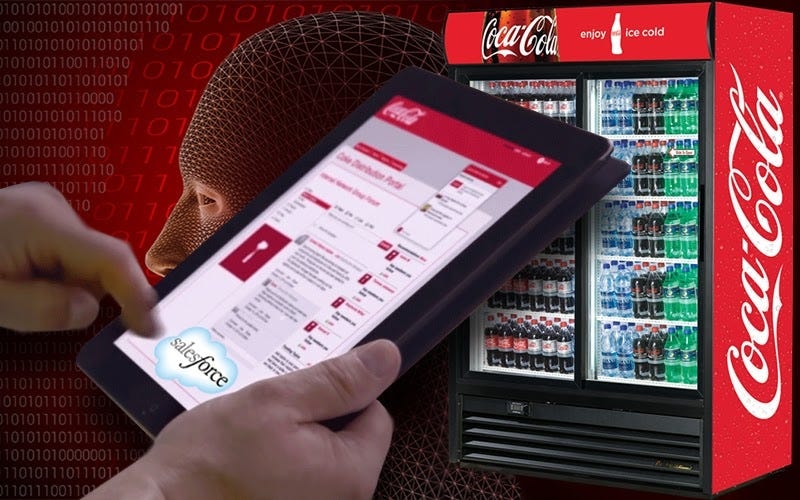
Source: Medium
Coca-Cola uses predictive analytics to tailor campaigns to specific audiences and predict product demand in different regions. They achieve this by analyzing data from social media, customer feedback, and retail channels worldwide.
However, Coca-Cola went more creative with its predictive analysis. They applied this technology to vending machines to better understand customer behavior and whether their brand targeted their audience. As a result, Coca-Cola identified trends and customer preferences in real-time.
This strategy enables them to optimize marketing spend by targeting high-potential regions and demographics, significantly enhancing ROI.
Case Study 3: Airbnb’s Programmatic Advertising
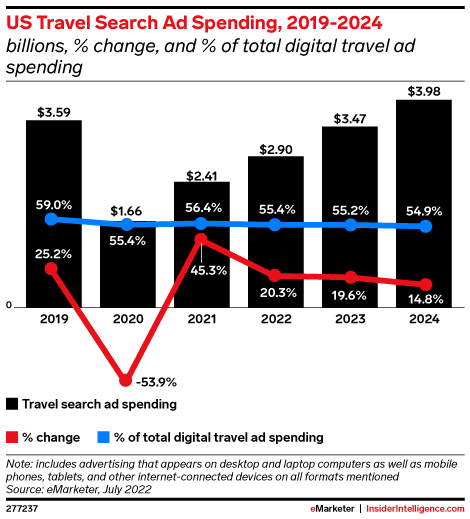
Source: eMarketer
Airbnb employs AI-powered programmatic advertising to reach specific target audiences on digital platforms.
By analyzing user behavior, Airbnb’s AI system identifies ideal customers and serves tailored ads across social media and search engines.
This approach has improved ad spend efficiency, delivering better results while minimizing costs. Programmatic advertising has served this company well; even with a 21% increase in ad spend, AirBnB has an annual revenue of 9.92 billion, which led to an increased marketing ROI.
Future Trends: How AI Will Continue to Shape Digital Marketing ROI
When discussing the future of AI, one thing is sure: AI will continue to grow and expand. That’s because there’s more of a demand for AI in marketing. The Conference Board surveyed marketers and found that 82% of respondents said AI will improve productivity. As AI technology advances, we can expect these significant transformations in marketing.
Hyper-Personalization
AI transformation will go beyond audience segmentation and focus on hyper-personalization. This means marketers can focus on individual customers, creating a personalized and better-quality user experience.
AI will tailor experiences based on even more granular customer data, delivering messages that resonate on a personal level and driving higher conversions. With the advent of technologies like natural language processing (NLP) and image recognition, hyper-personalized marketing can target messages to specific customers.
Voice-Activated Marketing
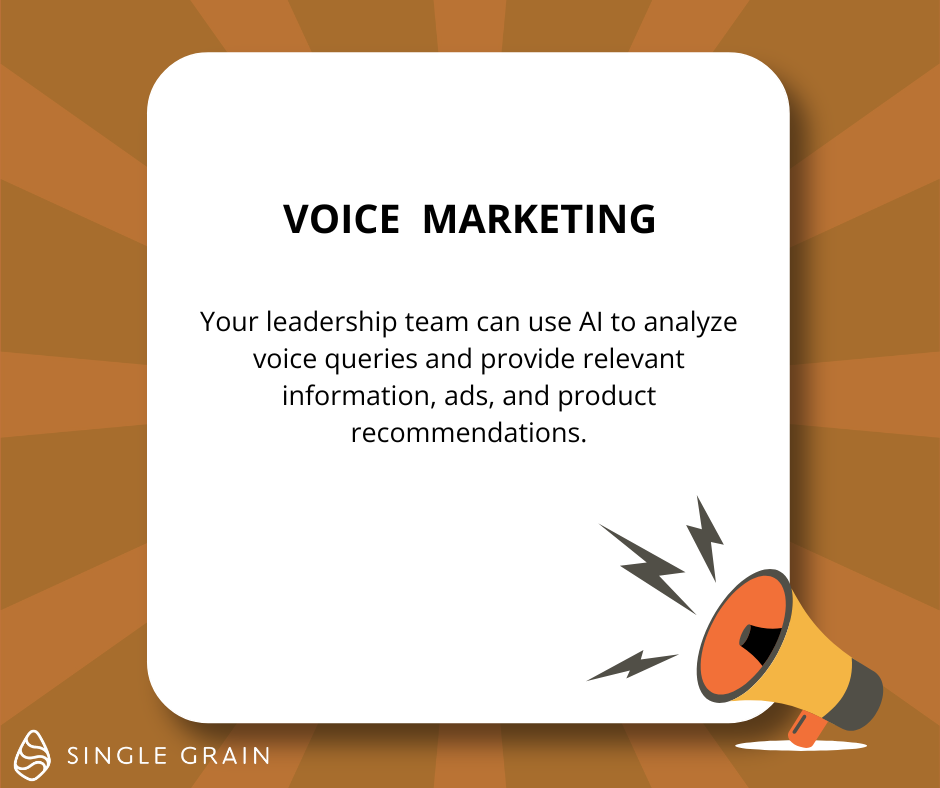
Voice marketing has accelerated a new era in search. In the U.S. alone, 58.6% of users tried voice search at least once.
Voice search and AI-powered voice assistants are increasingly popular; users find voice search faster and more convenient than typing out a search. Your leadership team can use AI to analyze voice queries and provide relevant information, ads, and product recommendations. This trend presents new opportunities for brands to engage users and boost ROI in voice-driven channels.
Predictive Customer Lifecycle Analysis
In the future, AI will better predict a customer’s journey and anticipate touchpoints that maximize engagement.
A business can use AI-driven technology to track sales, optimize marketing personalization, and offer better customer support. Predictive analysis will understand which point of the sales journey a customer is at. This will help your leadership team understand when and how to reach customers to optimize sales and retention efforts.
AI-Enhanced Creativity
Machine learning will increase writers’ productivity and creativity as AI content creation advances. Generative AI can increase creativity by as much as 26%.
AI tools that assist with content creation are emerging, and their understanding of complex data can help them make creative decisions. A business can use these tools to generate ideas, optimize creative assets like ad copy, and engage audiences more effectively, contributing to a higher marketing ROI.
Transforming Marketing ROI with AI
Integrating AI into marketing offers many benefits for boosting ROI, from better targeting and personalization to improved customer engagement and retention. A business that embraces AI-driven marketing can make smarter, data-backed decisions that lead to more effective campaigns and optimized spend.
When adopting AI transformation into a campaign, it’s a good idea to follow many best practices. These include setting clear goals, using quality data, continuously testing and iterating, and ensuring privacy compliance.
AI will continue to evolve, and those who leverage its capabilities will achieve a higher marketing ROI and deliver meaningful and personalized experiences that strengthen customer loyalty and drive long-term growth.
While AI can transform your marketing campaign, the experts will truly boost your ROI. Book a consultation to see how we can help you attract and retain more customers.
If you’re ready to level up your brand’s marketing with agentic workflows, Single Grain’s AI marketing experts can help!👇
Frequently Asked Questions on AI Transformation
-
What is AI transformation in marketing?
AI transformation uses advanced algorithms to analyze large amounts of data online in real-time. This can influence a marketing campaign by understanding customer preferences and behaviors. A business can automate many email, content, and social media tasks with machine learning technology.
-
What is the difference between AI and digital transformation?
Digital transformation is when an organization aims to innovate using agile and customer-centric technology. AI transformation takes this further; a business adopts tools and algorithms such as NLP and predictive analytics, where AI can operate independently to learn and identify customer behavior, solve problems in a strategy, and help organizations make more strategic decisions.
-
What's the first step marketers must take to adopt an AI transformation strategy?
Setting digital marketing objectives is the first step in any strategy, but a business must set specific goals that AI technology must accomplish.
Related Video
For more insights and lessons about marketing, check out our Marketing School podcast on YouTube.






